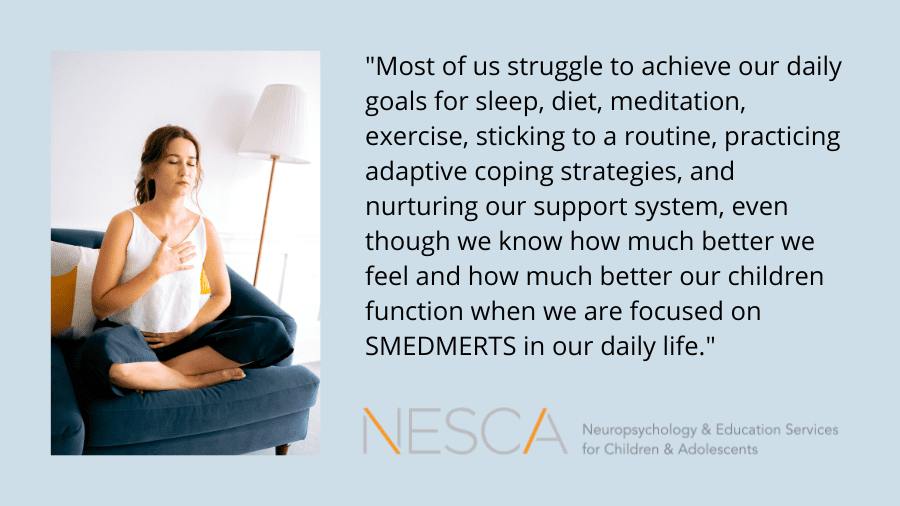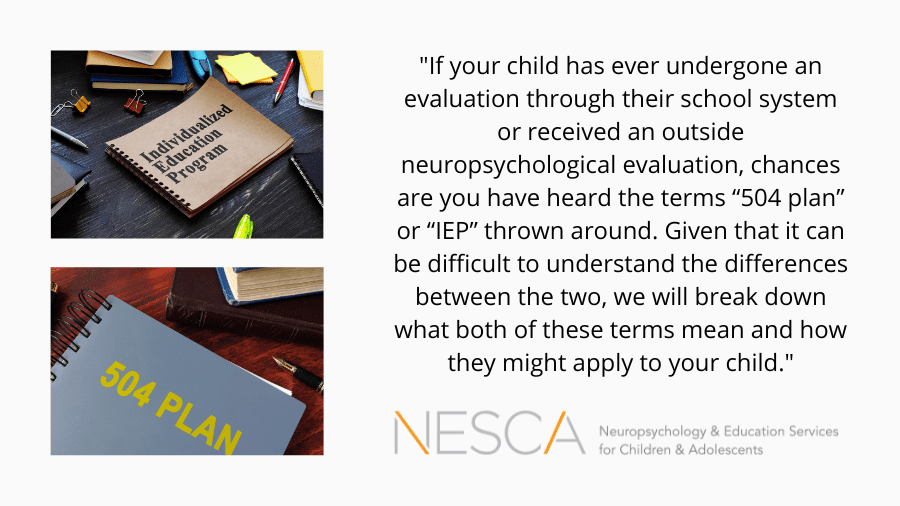
 By: Maggie Rodriguez, Psy.D.
By: Maggie Rodriguez, Psy.D.
Pediatric Neuropsychologist, NESCA
One of the most common referral questions I see in my work as a neuropsychologist is, “Does my child have ADHD?” When a child has trouble focusing, Attention-Deficit/Hyperactivity Disorder, or ADHD, is one of the first things that comes to mind, and for good reason. However, ADHD is only one potential underlying cause of inattention. In fact, there are many cases in which attentional difficulties are present as part of another underlying issue. Some of these include:
- Anxiety—On a physiological level, anxiety involves activation of the “fight or flight” response. This adaptive process is designed to alter attention in order to prioritize survival. When the brain senses a threat, it tunes out everything else so it can focus on dealing with the danger at hand. This is extremely useful when the threat is something like a wild animal chasing you. In that case, you need to momentarily shift all of your attention to survival. It’s the worst possible time to be distracted by anything that could divert your attention from escaping a dangerous situation. But when students are anxious, especially for extended periods of time, the same process can make it difficult to focus on day-to-day tasks, including learning.
- Learning Disorder—Students who lack the academic skills to engage with the curriculum can appear to be simply not paying attention. If a student’s reading skills, for instance, are several grade levels below expectations, they won’t be able to actively engage with written assignments or materials in class.
- Communication Disorder—Deficits in receptive and/or expressive language often manifest in ways that mimic inattention. If a child cannot grasp what is being communicated, they will have significant difficulty following verbal instructions, answering questions, and retaining important information. This can easily be misinterpreted as a sign of an attentional issue when, in reality, the underlying problem has to do with communication.
- Autism Spectrum Disorders (ASD)—Many individuals on the Autism spectrum tend to be more attuned and focused on internal experiences (e.g., their own thoughts and specific interests) than to the external environment. As a result, they can miss important information, ranging from social cues to expectations communicated at home or within the classroom.
- Other neurocognitive disorders—Weaknesses in other cognitive functions, particularly those we refer to as “cognitive proficiency” skills (e.g., processing speed) and executive functions (e.g., working memory, organization) can also result in apparent inattention. Students who cannot process information quickly are sometimes unable to keep up with the pace of instruction, which causes a diminished ability to comprehend and retain information. Similarly, students who cannot hold information in working memory or organize ideas and concepts can demonstrate reduced comprehension.
There is a range of other issues that can contribute to children or adolescents appearing inattentive. Some of these include trauma, absence seizures, hearing impairments, thought disorders and/or hallucinations, and Tourette’s Syndrome. It is important to thoroughly evaluate the potential causes of inattention and to consider an individual’s full history and presentation. Because different underlying issues will necessitate different treatment approaches, getting to the root of the issue can be tremendously important.
About the Author

Maggie Rodriguez, Psy.D., provides comprehensive evaluation services for children, adolescents, and young adults with often complex presentations. She particularly enjoys working with individuals who have concerns about attention and executive functioning, language-based learning disorders, and those with overlapping cognitive and social/emotional difficulties.
Prior to joining NESCA, Dr. Rodriguez worked in private practice, where she completed assessments with high-functioning students presenting with complex cognitive profiles whose areas of weakness may have gone previously undiagnosed. Dr. Rodriguez’s experience also includes pre- and post-doctoral training in the Learning Disability Clinic at Boston Children’s Hospital and the Neurodevelopmental Center at MassGeneral for Children/North Shore Medical Center. Dr. Rodriguez has spent significant time working with students in academic settings, including k-12 public and charter school systems and private academic programs, such as the Threshold Program at Lesley University.
Dr. Rodriguez earned her Psy.D. from William James College in 2012, where her coursework and practicum training focused on clinical work with children and adolescents and on assessment. Her doctoral thesis centered on cultural issues related to evaluation.
Dr. Rodriguez lives north of Boston with her husband and three young children. She enjoys spending time outdoors hiking and bike riding with her family, practicing yoga, and reading.
To book a consultation with Dr. Rodriguez or one of our many other expert neuropsychologists, complete NESCA’s online intake form.
Neuropsychology & Education Services for Children & Adolescents (NESCA) is a pediatric neuropsychology practice and integrative treatment center with offices in Newton, Massachusetts, Plainville, Massachusetts, and Londonderry, New Hampshire, serving clients from preschool through young adulthood and their families. For more information, please email info@nesca-newton.com or call 617-658-9800.



 delays, learning disabilities, attention difficulties and executive functioning challenges. She often works with children whose complex profiles are not easily captured by a single label or diagnosis. She particularly enjoys working with young children and helping parents through their “first touch” with mental health care or developmental concerns.
delays, learning disabilities, attention difficulties and executive functioning challenges. She often works with children whose complex profiles are not easily captured by a single label or diagnosis. She particularly enjoys working with young children and helping parents through their “first touch” with mental health care or developmental concerns.




 neuropsychologist who has been practicing for almost 20 years. In 1996, she jointly founded the Children’s Evaluation Center (CEC) in Newton, Massachusetts, serving as co-director there for almost ten years. During that time, CEC emerged as a leading regional center for the diagnosis and remediation of both learning disabilities and Autism Spectrum Disorders.
neuropsychologist who has been practicing for almost 20 years. In 1996, she jointly founded the Children’s Evaluation Center (CEC) in Newton, Massachusetts, serving as co-director there for almost ten years. During that time, CEC emerged as a leading regional center for the diagnosis and remediation of both learning disabilities and Autism Spectrum Disorders.




 Erin Gibbons, Ph.D.
Erin Gibbons, Ph.D.
 attention deficit disorders, communication disorders, intellectual disabilities, and learning disabilities. She particularly enjoys working with children and their families who have concerns regarding an autism spectrum disorder. Dr. Milana has received specialized training on the administration of the Autism Diagnostic Observation Schedule (ADOS).
attention deficit disorders, communication disorders, intellectual disabilities, and learning disabilities. She particularly enjoys working with children and their families who have concerns regarding an autism spectrum disorder. Dr. Milana has received specialized training on the administration of the Autism Diagnostic Observation Schedule (ADOS).
 By
By  Londonderry, NH office. She specializes in the evaluation of anxious children and teens, working to tease apart the various factors lending to their stress, such as underlying learning, attentional, or emotional challenges. She particularly enjoys working with the seemingly “unmotivated” child, as well as children who have “flown under the radar” for years due to their desire to succeed.
Londonderry, NH office. She specializes in the evaluation of anxious children and teens, working to tease apart the various factors lending to their stress, such as underlying learning, attentional, or emotional challenges. She particularly enjoys working with the seemingly “unmotivated” child, as well as children who have “flown under the radar” for years due to their desire to succeed.
Connect with Us